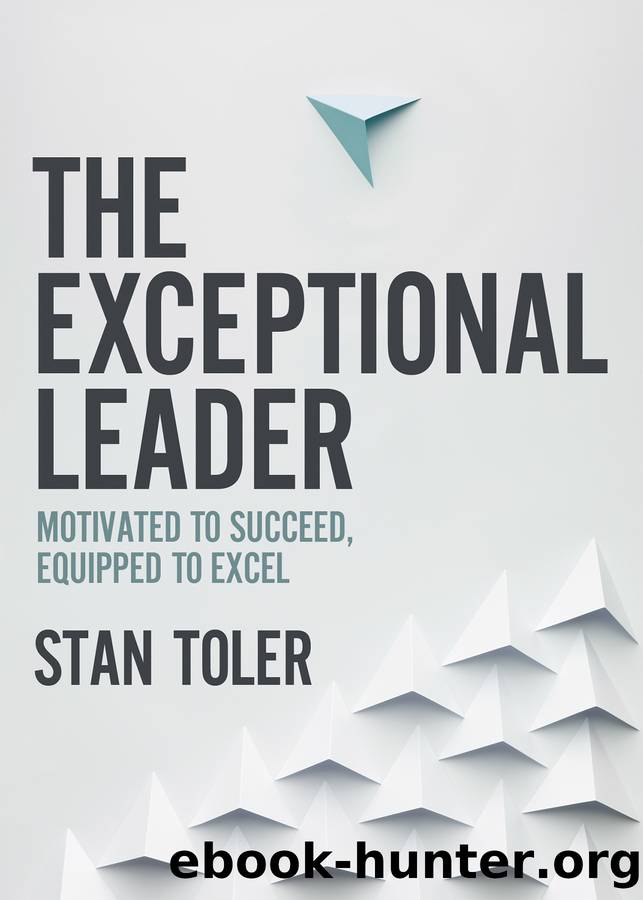The Exceptional Leader by Stan Toler

Author:Stan Toler
Language: eng
Format: epub
ISBN: 9780736980753
Publisher: Harvest House Publishers
Published: 2022-05-09T00:00:00+00:00
SHELLS FROM THE MENTORâS BASKET
Shell 1: Deal with Conflict as It Arises
Leaders understand that their primary enemy is disunity, not differences. Effective leaders neither welcome nor run from conflict. They respond to it appropriately as the need arises. Conflict is a celebration of the human spiritâthe diversity of perceptions, experiences, gifts, and free will. So long as conflict can add to better understanding, heightened commitment, greater communicationâthus problem solvingâit should be embraced. Avoiding conflict in order to muffle any communication that isnât in complete agreement with you and ostracizing messengers bearing bad news are signs of unhealthy leadership.
To enjoy conflict is neurotic. To hate it to the point of avoiding it at all costs is pathological in the other direction. Good leaders know the balance.
The reason we dread conflict is because we have heard about dismal outcomes. Like the Pavlovian response of a mistreated dog that flinches at the mere raising of a hand, people with negative conflict experiences wince at anything reflecting differences of opinion. Think about the following four ways to deal with conflict:
1. Use excellent communication to avoid conflict. The root of many differences of opinion is a lack of information. Making sure team members, especially decision makers, are kept in the loop is an important means of avoiding unnecessary conflicts. Team buildingâwhere people interact for community, relationship building, and even funâgoes a long way in avoiding tension points.
2. Welcome the messenger of conflict. People who deliver less than positive messages should be esteemed and affirmed for their willingness to get involved. When leaders reject a person raising a conflict issue, they give the appearance of being closed minded. This reflects poorly on the leader, and perception is vital to influence.
3. Never allow conflict to smolder. People will not approach a leader if they feel intimidated. Therefore, itâs the leaderâs responsibility to initiate contact with those in conflict. To confront an organizational matter is what leaders are supposed to do. While you should not micromanage, you also should not let a small sliver become a big infection. Behave like an organizational doctor and address the situation.
4. Respond to conflict appropriately. You should not shoot a fly with a bazooka, but neither should you place a Band-Aid on a life-threatening wound. Confront one-on-one. Listen. Ask questions. Withhold judgment. Request suggestions from the parties involved. Should you come to an impasse, include others in the process. Express appreciation to the person, and always be gracious.
Shell 2: Let Your Servanthood Shine Through
Leaders are in the people business. Were it not for people, leadership would not exist. Effective leaders do not think of themselves as CEOs, superiors, presidents, or chairpersons. Instead, they foster the image of a servant. They exist to help others. In the context of leadership, the tool for serving may not be a towel and basin, but rather the gift of influence. The ability to unify leadership is unique and is vital to the success of an organization. Churches, businesses, and communities needing to experience change require leaders who will assist people in their journey to vision fulfillment.
Download
This site does not store any files on its server. We only index and link to content provided by other sites. Please contact the content providers to delete copyright contents if any and email us, we'll remove relevant links or contents immediately.
Joan of Arc by Mary Gordon(3987)
Victory over the Darkness by Neil T. Anderson(2784)
The Gnostic Gospels by Pagels Elaine(2445)
Devil, The by Almond Philip C(2249)
The Nativity by Geza Vermes(2153)
The Psychedelic Gospels: The Secret History of Hallucinogens in Christianity by Jerry B. Brown(2097)
Going Clear: Scientology, Hollywood, and the Prison of Belief by Lawrence Wright(1912)
Going Clear by Lawrence Wright(1897)
A TIME TO KEEP SILENCE by Patrick Leigh Fermor(1813)
Barking to the Choir by Gregory Boyle(1749)
Old Testament History by John H. Sailhamer(1734)
Augustine: Conversions to Confessions by Robin Lane Fox(1716)
A History of the Franks by Gregory of Tours(1655)
A Prophet with Honor by William C. Martin(1646)
The Bible Doesn't Say That by Dr. Joel M. Hoffman(1623)
The Knights Templar by Sean Martin(1610)
by Christianity & Islam(1580)
The Amish by Steven M. Nolt(1509)
The Source by James A. Michener(1506)
